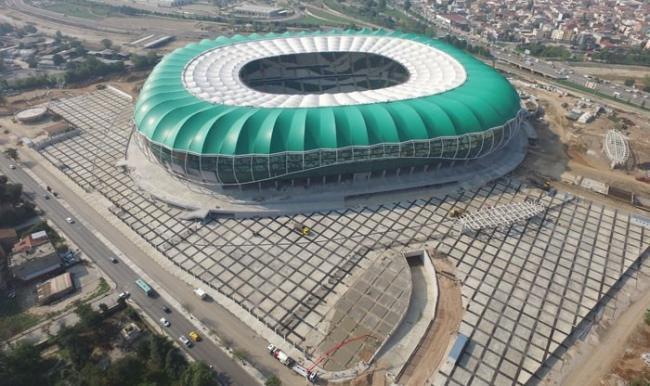New stadiums testify to the death of Turkish football
 Sports and politics have never been two separate issues, especially in a country such as Turkey. After 13 years of one-party rule, the influence of the Justice and Development Party (AKP) on Turkish sports is ever obvious.
Sports and politics have never been two separate issues, especially in a country such as Turkey. After 13 years of one-party rule, the influence of the Justice and Development Party (AKP) on Turkish sports is ever obvious.Football, the most popular sport in the country – and the world – was of course the focus of the AKP’s attention.
An easy way to reach out to the hundreds of thousands of football fans was to build stadiums for the clubs they support, naturally by using public funds.
A totally covered 33,000-seated stadium was built in Kayseri (the hometown of former President Abdullah Gül where the AKP enjoys the support of 65 percent of the voters) to be used by Kayserispor and Kayseri Erciyesspor, while one with a capacity of 42,000 seats that was built in Konya (hometown of Prime Minister Ahmet Davutoğlu, voter support of 75 percent) is the home of Torku Konyaspor and has hosted three national football games since. A 41,000-seated stadium in Trabzon is under construction for Trabzonspor, and another 34,000-seated stadium is being built in Samsun (the hometown of Turkey’s former and current sports minsters).
There are some other examples of this pattern, such as Şanlıurfa, Eskişehir and Sivas, as the government builds 24 new stadiums in 24 cities at an estimated total cost of 3.5 billion Turkish Liras ($1.2 billion).
In the capital city of Ankara, Osmanlıspor, formerly known as Ankaraspor, enjoys a 20,000-seated stadium, thanks to its honorary chairman, Melih Gökçek, the city’s mayor of 21 years. On the other hand, decades-old clubs Gençlerbirliği, Ankaragücü and Hacettepe share the 19 Mayıs Stadium.
In İzmir, Turkey’s third biggest city, the city’s top three club’s play their games at the city’s only suitable stadium: Atatürk Stadium, which was built in 1971. (It is a vicious slander to say that the reason is because over 50 percent of İzmir residents vote for the main opposition Republican People’s Party - CHP).
The latest example of the public-funded stadiums is one built in the northwestern province of Bursa, my hometown. The idea at first was to build a new home for the city’s main football club, Bursaspor, which won the title in Turkey’s top flight in 2010 to become only the fifth club to achieve the honor.
The construction stadium was undertaken by Bursa Metropolitan Municipality.
In exchange, the municipality took over the land of Bursaspor’s current home, the Atatürk Stadium, which is located in the heart of the city on very valuable land. It is still not clear whether this land will be turned into a park or will host the city’s newest business and mall complex.
The exterior of the stadium was to be designed to be shaped like a crocodile’s body and head, since the crocodile is the club’s mascot mainly due to its green color. The new stadium was to be named the “Timsah Arena” (Crocodile Arena).

Timsah Arena project
The excitement for the opening game of the stadium was already in the air when its foundations were laid.
The game would be played between Bursaspor and a European giant, such as Real Madrid or Barcelona.
Unfortunately, reality then kicked in. First, the head of the crocodile figure, which was what was to give the stadium its unique look, was scrapped and the shiny green roof in the plan was changed to a pale color that we are used to seeing, especially in the roofs of Ottoman-era tombs.
Bursa Mayor Recep Altepe had no intention of naming the stadium “Timsah Arena,” especially not after President Recep Tayyip Erdoğan said in a meeting in Bursa ahead of the March 30, 2014, local elections that “a better name could have been found, one that suits Bursa.” So it is now officially “Bursa Metropolitan Stadium,” as he who pays the piper calls the tune.

Bursa Metropolitan Stadium
And the opening of the stadium, which was made on Dec. 21, was nothing more than a poor political show.
After promising a European giant, and later arguing that a meeting between green and white football clubs, such as Celtic or Wolfsburg, would be more suitable for the first game, what did we get? A game between two teams of washed-up football stars kicked off by President Erdoğan in green football boots.
Texas, the main supporter group of Bursaspor, had already announced that they would not be a part of this charade, so the AKP mobilized its members to fill the stadium on the opening day with thousands of people being ferried to Bursa from its districts and surrounding provinces.
Tainted by a major match-fixing scandal, poisoned by politics and beset by fan violence, this country’s football already has too little to offer to true sport enthusiasts, despite the millions of dollars spent on bringing in world-renowned players.
Turkish football is dying, and these new stadiums all around the country will be their tombstones.











